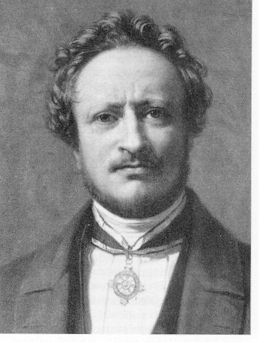<Back to Index>
- Physician Johannes Peter Müller, 1801
- Director Ernst Ingmar Bergman, 1918
- 2nd Chief Minister of the French Monarch Cardinal Jules Mazarin, 1602

Johannes Peter Müller (July 14, 1801 – April 28, 1858), was a German physiologist, comparative anatomist, and ichthyologist not only known for his discoveries but also for his ability to synthesize knowledge.
Müller was born in Koblenz.
In 1819 he entered Bonn University, where he became Privatdozent in 1824, extraordinary professor of physiology in 1826, and ordinary professor in 1830. In 1833 he went to the Humboldt University of Berlin, where he filled the chair of anatomy and physiology until his death. Müller made contributions in numerous domains of physiology, in particular increasing understanding of the voice, speech and hearing, as well as the chemical and physical properties of lymph, chyle and blood.
The appearance of his Handbuch der Physiologie des Menschen between 1833 and 1840 (translated into English by Dr William Baly, and published in London in 1842) marked the beginning of a new period in the study of physiology. In it, for the first time, the results of human and comparative anatomy, as well as of chemistry and other departments of physical science, were brought to bear on the investigation of physiological problems.
The most important portion of the work was that dealing with nervous action and the mechanism of the senses. Here he stated the principle, not before recognized, that the kind of sensation following stimulation of a sensory nerve does not depend on the mode of stimulation but upon the nature of the sense-organ. Thus light, pressure, or mechanical stimulation acting on the retina and optic nerve invariably produces luminous impressions. This he termed the law of specific energies of the sense. In the later part of his life he chiefly devoted himself to comparative anatomy. Fishes and marine invertebrata were his favorite subjects. Müller mentored such distinguished scientists and physiologists as Hermann von Helmholtz, Emil du Bois-Reymond, Theodor Schwann, Friedrich Gustav Jakob Henle, Carl Ludwig and Ernst Haeckel.
In 1834, he was elected a foreign member of the Royal Swedish Academy of Sciences.
Müller died in Berlin in 1858.